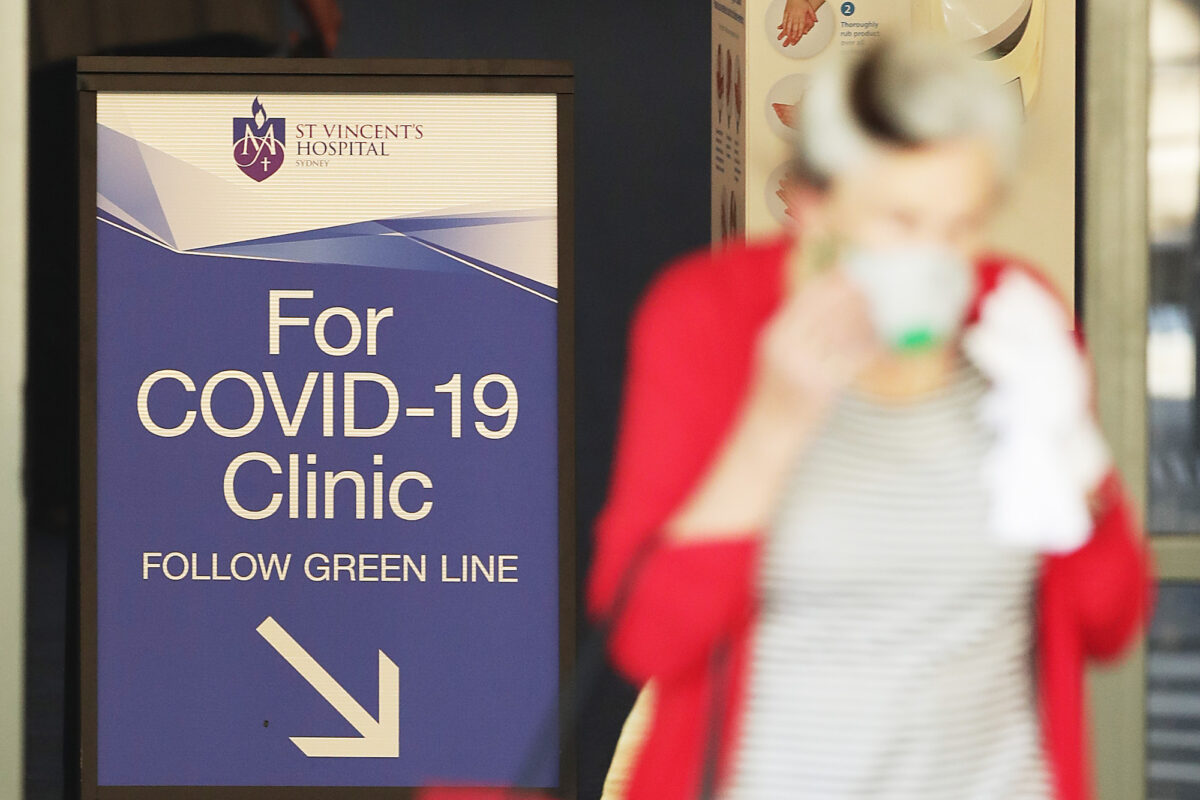Hello to Medical Censorship in Australia
Commentary On Oct. 12, the Queensland Labor government—with support from the Liberal-National Party opposition—passed the Health Practitioner Regulation National Law and Other Legislation Amendment Bill 2022. This may result in amendments to the legislation of all other Australian states, to ensure a uniform “national law” that turns government-linked entities into a single authority on all health advice in the nation. Indeed, Section 59 (5) of the Act subjects health practitioners to the threat of immediate suspension of their license for daring to contradict public health directions and official public health messaging. Under Section 90AA (1)(b), discretionary powers are given to a “health ombudsman” to issue a statement if they believe the public’s safety may be at risk. Further, under subsections (3) (a) and (b) the ombudsman can identify and issue a warning or “information” about a person and the service they provide—a guilty until proven innocent type clause. These powers will give authorities wide-ranging powers to discipline health workers while overriding “notions of natural justice and the presumption of innocence,” according to the Australian Medical Professionals Society (pdf). Any health professional who dares to question or challenge public policy directives may be publicly named, shamed, and blamed. Goodbye to Medical Free Speech? So now it is official. Professionals in Australia are no longer allowed to question the public health advice of the government without losing their registration. “They have outlawed opinions,” says Ramesh Thakur, emeritus professor at the Australian National University’s Crawford School of Public Policy and a former U.N. assistant secretary-general. The professor said the move was “scandalous.” The effort to shut down legitimate debates on pain of excommunication from the medical profession represents a clear and present danger to public health,” he wrote. People pass signs for a COVID-19 Clinic as they enter or exit St Vincent’s hospital in Sydney, Australia on March 18, 2020. (Mark Metcalfe/Getty Images) Fortunately, the drafters of the Australian Constitution endorse the traditional common law approach that recognises free speech as a basic right of the individual. Under our Constitution, sovereignty ultimately resides in the people of Australia. As a sovereign people, Australians must be free to communicate about political matters fully and frankly, because this is critical to holding all the branches of government accountable. This notion of popular sovereignty, according to U.S. constitutional law professor James Weinstein, “creates a very powerful right of free speech.” “If, to the contrary, the government were able to prohibit speech on the ground that it will persuade the populace to formulate erroneous public policy, then that government, not the people, would be the ultimate sovereign,” he said in 2009. What About the Doctor-Patient Relationship? There is, even more, to say about the unconstitutionality of this legislation. Section 51(xxiiiA) of the Australian Constitution allows for the granting of medical services but not to the extent of authorising any form of civil conscription. The concept of civil conscription was first considered by Justice Dudley Williams of the High Court in 1949, in British Medical Association v Commonwealth. According to Williams, the term invalidates any law that “compels medical practitioners or dentists to provide any form of medical service.” Doing this is supposed to ensure that the doctor-patient relationship remains a contractual relationship between both parties. Justice Michael Kirby further argued in Wong v Commonwealth and Selim v Professional Services Review Committee (2009), that the test to find out whether civil conscription had been imposed is whether a law intrudes into the “private consensual arrangements between the providers of medical and dental services and the individual recipients of such services.” These judicial views are supported by the Nuremberg Code which has as its first principle, the willingness and informed consent by the individual to receive medical treatment or to participate in an experiment. Which leads to the question of vaccine mandates and how they are propped up by public health orders that are now even harder to scrutinise than ever under the Health and Practitioner Regulation National Law and Other Legislation Amendment Act 2022. A visitor watches the exhibition at the Memorial to the Nuremberg Trials in Nuremberg, Germany, on Oct. 23, 2019. (chrisdorney/Shutterstock) The law suppresses freedom of political communication by censoring and punishing dissenters in the health profession through threats to their careers and livelihood, as a means to control public debate through enforced medical censorship. If passed by other jurisdictions, such a law will fundamentally reshape the relationship between doctors, patients, and health regulators, to the detrim

Commentary
On Oct. 12, the Queensland Labor government—with support from the Liberal-National Party opposition—passed the Health Practitioner Regulation National Law and Other Legislation Amendment Bill 2022.
This may result in amendments to the legislation of all other Australian states, to ensure a uniform “national law” that turns government-linked entities into a single authority on all health advice in the nation.
Indeed, Section 59 (5) of the Act subjects health practitioners to the threat of immediate suspension of their license for daring to contradict public health directions and official public health messaging.
Under Section 90AA (1)(b), discretionary powers are given to a “health ombudsman” to issue a statement if they believe the public’s safety may be at risk.
Further, under subsections (3) (a) and (b) the ombudsman can identify and issue a warning or “information” about a person and the service they provide—a guilty until proven innocent type clause.
These powers will give authorities wide-ranging powers to discipline health workers while overriding “notions of natural justice and the presumption of innocence,” according to the Australian Medical Professionals Society (pdf).
Any health professional who dares to question or challenge public policy directives may be publicly named, shamed, and blamed.
Goodbye to Medical Free Speech?
So now it is official. Professionals in Australia are no longer allowed to question the public health advice of the government without losing their registration.
“They have outlawed opinions,” says Ramesh Thakur, emeritus professor at the Australian National University’s Crawford School of Public Policy and a former U.N. assistant secretary-general.
The professor said the move was “scandalous.”
The effort to shut down legitimate debates on pain of excommunication from the medical profession represents a clear and present danger to public health,” he wrote.

Fortunately, the drafters of the Australian Constitution endorse the traditional common law approach that recognises free speech as a basic right of the individual.
Under our Constitution, sovereignty ultimately resides in the people of Australia. As a sovereign people, Australians must be free to communicate about political matters fully and frankly, because this is critical to holding all the branches of government accountable.
This notion of popular sovereignty, according to U.S. constitutional law professor James Weinstein, “creates a very powerful right of free speech.”
“If, to the contrary, the government were able to prohibit speech on the ground that it will persuade the populace to formulate erroneous public policy, then that government, not the people, would be the ultimate sovereign,” he said in 2009.
What About the Doctor-Patient Relationship?
There is, even more, to say about the unconstitutionality of this legislation. Section 51(xxiiiA) of the Australian Constitution allows for the granting of medical services but not to the extent of authorising any form of civil conscription.
The concept of civil conscription was first considered by Justice Dudley Williams of the High Court in 1949, in British Medical Association v Commonwealth.
According to Williams, the term invalidates any law that “compels medical practitioners or dentists to provide any form of medical service.”
Doing this is supposed to ensure that the doctor-patient relationship remains a contractual relationship between both parties.
Justice Michael Kirby further argued in Wong v Commonwealth and Selim v Professional Services Review Committee (2009), that the test to find out whether civil conscription had been imposed is whether a law intrudes into the “private consensual arrangements between the providers of medical and dental services and the individual recipients of such services.”
These judicial views are supported by the Nuremberg Code which has as its first principle, the willingness and informed consent by the individual to receive medical treatment or to participate in an experiment.
Which leads to the question of vaccine mandates and how they are propped up by public health orders that are now even harder to scrutinise than ever under the Health and Practitioner Regulation National Law and Other Legislation Amendment Act 2022.

The law suppresses freedom of political communication by censoring and punishing dissenters in the health profession through threats to their careers and livelihood, as a means to control public debate through enforced medical censorship.
If passed by other jurisdictions, such a law will fundamentally reshape the relationship between doctors, patients, and health regulators, to the detriment of every single Australian citizen.
This is an abridged version of a seminar paper presented by Professor Augusto Zimmermann at “Stop Medical Censorship WA,” a symposium held by the Australian Medical Professionals Society in Perth, Western Australia, on Nov. 17, 2022.
Views expressed in this article are the opinions of the author and do not necessarily reflect the views of The Epoch Times. Epoch Health welcomes professional discussion and friendly debate. To submit an opinion piece, please follow these guidelines and submit through our form here.












